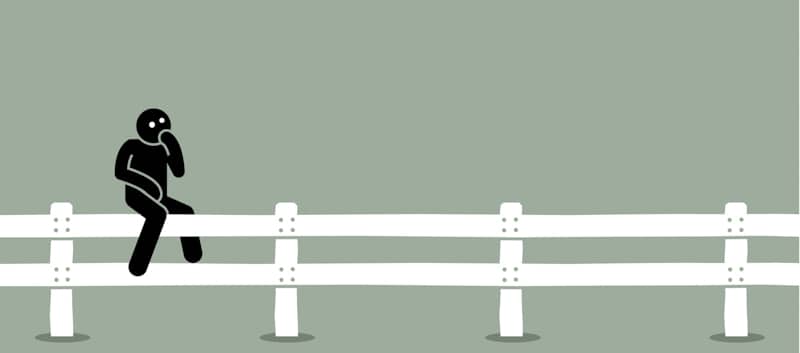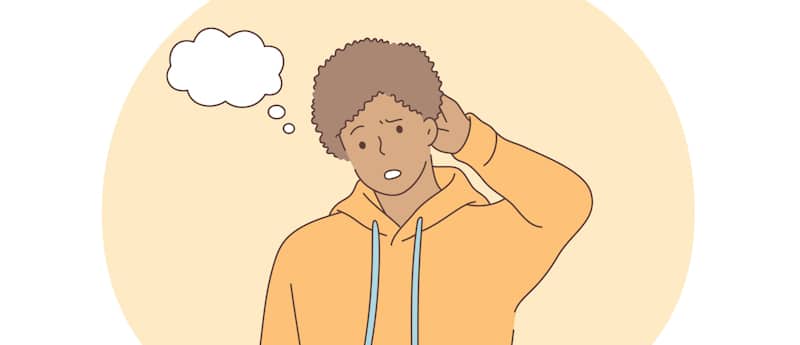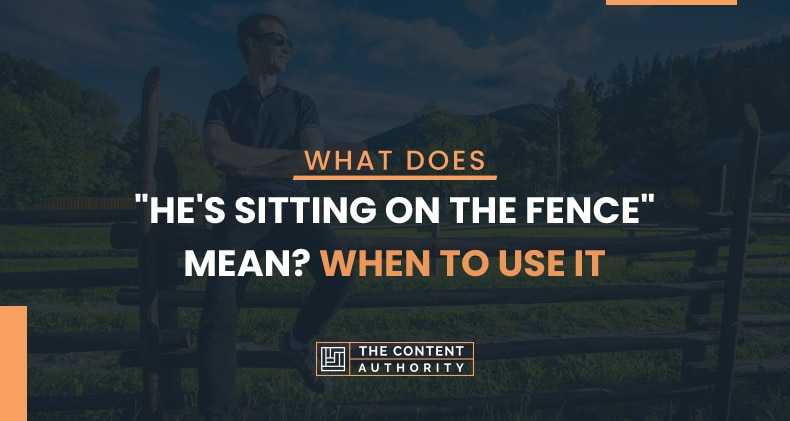When you are having a conversation with someone, the last thing you want to do is stop them to ask what they mean when they say something. However, there are some idioms in the English language that simply aren’t easy to understand. One of these is the phrase, “He’s sitting on the fence.”
Have you been told, “he’s sitting on the fence” and find yourself wondering what it means? It simply means that the person in question is acting as though they are indecisive, neutral, or hesitant. The person in question simply cannot make a choice or a decision. They can’t make up their mind.

Meaning of the Phrase
When you hear the idiom, “sitting on a fence” it’s used to mean that a person is being indecisive, neutral, or acting hesitant when it comes to choosing between two different sides in an argument or a competition. The reason for acting this way may be due to the person feeling apathetic or simply lacking the courage to make a decision. Sometimes people will act this way so that they can remain on good terms with both parties. At other times a person may truly not agree with either side of the argument. Regardless of why someone is acting this way, when someone “sits on the fence” they will maintain a neutral, non-committed view of the situation and of any of the other parties who are involved.
There are times when a person will “sit on the fence” so that they’re able to remain on good terms with everyone. This is because when someone chooses aside the people who are on the opposite side may be offended. They’ll definitely be unhappy with the choice that others who oppose them have made. There are also some people who lack courage here or simply don’t want to be faced with a confrontation. Obviously, there are also some people who are indecisive by nature.
A great way in which you can easily remember what this phrase actually means is to think of a fence that is located between two yards. It is up to you to decide which of the two yards you’re going to play in. The choice you’re making here doesn’t have to be yards. It could be anything including jobs, schools, basketball teams, even food. The point is that you can’t make a decision. Once you do make a decision you are no longer on the fence.
It’s also important to understand that you can use this idiom in different sentences like “sitting on the fence” or “sat on the fence.” You can also use different verbs in place of sit (e.g. stay). For instance, you could say “Democrats were on the fence about the election.” Sometimes this behavior is referred to as fence-sitting with the person who’s sitting on the fence being called a “fence-sitter.” This is where you get expressions like, “There was a lot of fence-sitting at his first press conference probably because there are a lot of fence-sitters out there on this issue.” Typically, expressions like this are used to show your disapproval of the fact that someone is being indecisive.
Some of the other ways that you can say “he’s sitting on the fence” include:
- Not taking sides in a dispute
- Not committing oneself
- Avoiding taking sides when there are two possibilities
- Being undecided about something
- Remaining neutral at a time when a choice or decision is required
- Not having a stance or an opinion about a topic
- To be unwilling or unable to commit to one side of an argument
- To be uncommitted
- To be uncertain
- To be undecided
- To vacillate
Origin of the Phrase
Now that you have a better understanding of what the phrase “sitting on the fence means,” you may wonder who on Earth came up with such a crazy phrase. Originally this phrase had its roots in Middle English. There the word ‘fens,’ which was short for the word ‘defens’ originated. Eventually, an “e” was added to the word ‘defens’ to form the word “defense” and we have the word as we now know it today.
When you stop to think about how fences are oftentimes used to define property ownership and how a person who’s sitting on a physical fence must straddle it you can imagine them being between the two properties. This is where you get the metaphoric meaning of the phrase “sitting on the fence” meaning that he’s straddling a position between two ideas and he isn’t committing to either of the ideas.
Some people believe that this is an expression that dates as far back as the Revolutionary War. At that time it was used when speaking about a judge who hadn’t committed himself to either the Revolutionaries or the Loyalists. When George Washington asked one of the judge’s slaves which way his master was leaning it is believed that the slave replied, “Until my master knows which is the strongest group, he’s staying on the fence.” The saying then began to be used more frequently because Washington himself started using it more since he found it to be both apt and amusing.

Regardless of where it first originated, this phrase has been popular since the 1800s. This is especially true when it comes to discussing political matters. The phrase itself is purely visual in nature even when used in discussing politics. When you think of someone who hops down one side of the fence you think of them going in one direction but when they hop down on the other side of the fence you think of them going in the opposite direction. However, if you merely stay seated on the fence you won’t get anywhere at all.
The Mugwumps (a group of Republicans who were backing the Democratic candidate in the 1884 U.S. election) are some of the most famous political fence-sitters. They were named after the Algonquin ‘Mugquomp’ which meant “an important person.” In this way, the term wasn’t meant to show respect but rather to mock them. Those who spoke out against them described them as birds who’d sit on a fence with their mug on one side and their wump on the other side. This is ironic when you stop to think about the fact that the Mugwumps really weren’t sitting on a fence at all. They’d actually made a hard decision and chose their side.
Example Sentences
Now that you know what this phrase means you may want to use it in some of your conversations. Here are a few examples of sentences that will help you get started:
- Has he made a decision yet or is he still sitting on the fence?
- You can’t afford to sit on the fence any longer. You need to make up your mind.
- Instead of merely sitting on the fence you should take some time to weigh the pros and cons so that you can make a decision.
- It’d be nice if you’d stop sitting on the fence and decide whose side you’re on.
- Since he didn’t want to tell anyone no, he just continued to sit on the fence.
- She didn’t know how she wanted to answer the question so she remained seated on the fence.
- When two leaders are arguing it’s best to take a seat on the fence so that you don’t get either of them to turn against you.
- Considering he usually stays seated on the fence, it’s surprising that he actually chose a side this time.
- It’s time to stop sitting on the fence and make up your mind.
- He’s someone who isn’t afraid to make decisions. You won’t ever see him seated on the fence.
More English Idioms
A Word About Ambivalence

In order to truly understand what the phrase “he’s sitting on the fence” means, you must have at least some understanding of what ambivalence is about. This is a state of being wherein a person has conflicting reactions, beliefs, or opinions regarding a subject. In other words, they have both positive and negative views (a.k.a. “mixed feelings”) of this person or thing.
While most people’s actions are typically guided by their feelings, this isn’t the case when someone is feeling ambivalent. The less certain someone is with their attitude the more unpredictable and indecisive they behave. This makes them more likely to succumb to things like peer pressure, especially when they’re given compelling attitude-relevant information.
Most people don’t find that having both positive and negative views of a subject is unpleasant. However, there can come a time when sitting on the fence would make a person feel uncomfortable because they will try to avoid (or at the very least procrastinate) any attempts that are made to resolve this ambivalence.
Conclusion
Hopefully now the next time you hear that someone’s “sitting on a fence” you’ll have a better understanding of what the person is talking about. While the exact origin of this phrase may be a bit muddled, one thing is for sure: This phrase means that someone is being apathetic and refusing to choose sides.
Shawn Manaher is the founder and CEO of The Content Authority. He’s one part content manager, one part writing ninja organizer, and two parts leader of top content creators. You don’t even want to know what he calls pancakes.

